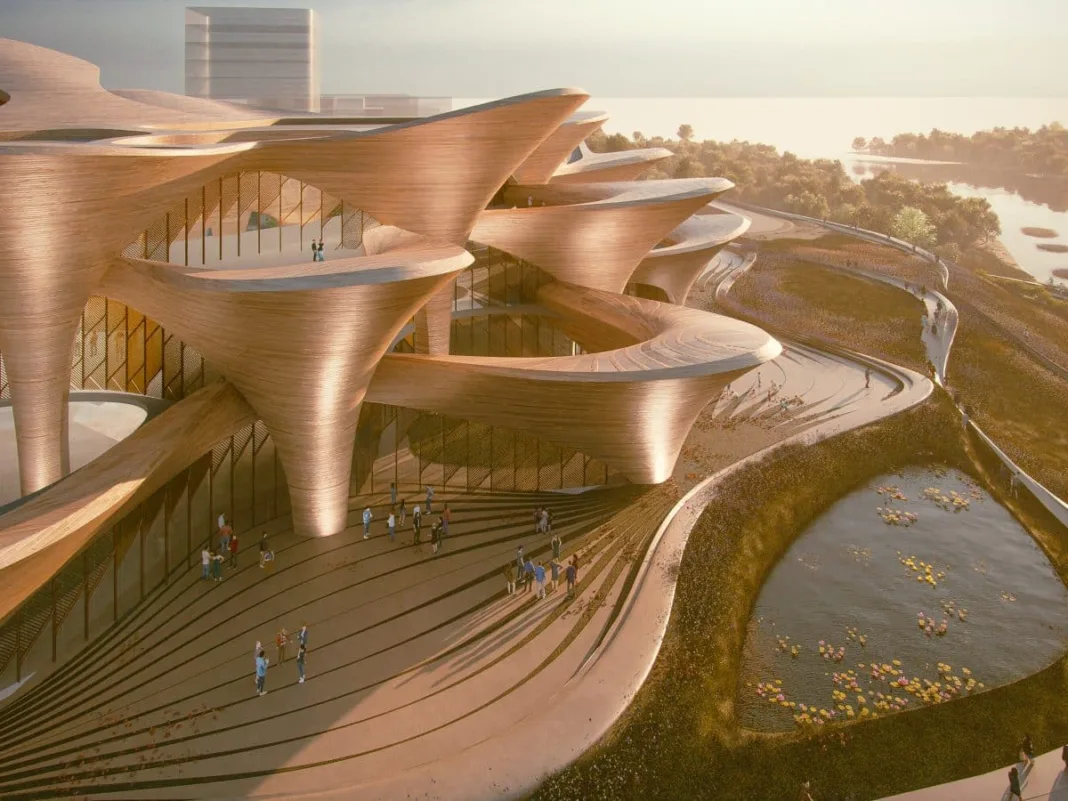The Alisher Navoi International Scientific Research Centre in New Tashkent will combine tradition and modernity. Designed by Zaha Hadid Architects (ZHA), this 23,000 sq. m cultural centre will focus on preserving and promoting Uzbek language, literature, and music. Named after Alisher Navoi, the 15th-century poet who significantly influenced Uzbek culture, the centre will be both an educational and creative hub. Situated in the cultural quarter of New Tashkent, it will play a vital role in the city’s development while reflecting the nation’s rich cultural heritage.

Project Team and Design Collaboration
The Alisher Navoi International Scientific Research Centre will be designed by Zaha Hadid Architects (ZHA), with Patrik Schumacher as the principal. The project will be overseen by project directors Paolo Matteuzzi and Paulo Flores, while Effie Nakajima, Karoly Markos, Luca Ruggeri, and Davide Del Giudice will lead the architectural design. Structural engineering, environmental consulting, and MEP services will be provided by Buro Happold, ensuring the Centre’s sustainability and operational efficiency.
Key Features of the Alisher Navoi International Scientific Research Centre
The Alisher Navoi Centre will combine education, research, and the arts with several specialized facilities. These will include:
- Navoi State Museum of Literature: Housing over 3,500 historical books and manuscripts, with thirteen permanent exhibition halls on Uzbek literary history.
- 400-Seat Auditorium: A space for cultural events, performances, and conferences.
- International Research Centre: Dedicated to research in Uzbek language, literature, and music.
- Residential School: Accommodating 200 students specializing in Uzbek studies, providing an immersive learning environment.

Architectural Inspiration and Sustainable Design
The design of the Alisher Navoi Centre will reflect traditional Uzbek architecture. The building will feature arched facades made from locally produced bricks, with courtyards integrated to provide natural light and ventilation. These courtyards will create spaces for reflection and social interaction.
The structure will use passive cooling techniques to improve comfort and reduce energy consumption. Hollow supporting arches, inspired by traditional wind towers, will channel ventilation into the building. The thermal chimney effect will help extract hot air, promoting natural airflow during warmer months. High thermal mass materials and deep roof overhangs will contribute to the building’s energy efficiency, maintaining a comfortable interior temperature year-round.
- Cooling Ventilation: Hollow arches will capture and direct wind, improving natural ventilation.
- Thermal Chimney Effect: This design will help extract warm air through openings at the top of the arches.
- Natural Lighting: Skylights and courtyards will reduce the need for artificial lighting.
- Energy Efficiency: The combination of passive cooling and thermal mass will ensure year-round comfort.

A Hub for Education and Innovation
The design will also honour Shashmaqom, a classical Uzbek music tradition. The centre will feature landscaped terraces, open-air amphitheatres, and shaded gardens, encouraging musical performances and community gatherings. These outdoor spaces will celebrate Uzbek cultural heritage.
Beyond exhibitions and performances, the Alisher Navoi Centre will be an educational institution. Its integration of modern design with traditional elements will create a space for students, researchers, and artists. The residential school and research facilities will help nurture new generations of scholars and artists who will work to preserve and advance Uzbekistan’s cultural heritage.

A Vision for the Future
The Alisher Navoi International Scientific Research Centre will represent a vision for the intersection of culture, sustainability, and education. Through its design, the centre will help preserve Uzbekistan’s cultural traditions while addressing the needs of its growing urban population. This integration of the old and new will position the Alisher Navoi Centre as an important cultural institution both within Uzbekistan and internationally.
Images- architectandinterioridindia.com, zahahadid.com





